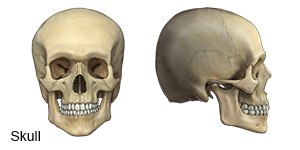Skull Fracture in Children
Medically reviewed by Drugs.com. Last updated on Aug 4, 2025.
A skull fracture is a break in a bone in your child's head.
 |
DISCHARGE INSTRUCTIONS:
Call your local emergency number (911 in the US) if:
- Your child has a seizure.
Seek care immediately if:
- Your child is suddenly dizzy and short of breath.
- Your child seems confused or more fussy, restless, or sleepier than usual.
- Your child has blood or fluid coming out of one or both ears.
- Your child is not hearing well, has slurred speech, or blurred vision.
- Your child has weakness on one side of his or her body or trouble with balance.
- One of your child's pupils is larger than the other.
Call your child's doctor or neurologist if:
- Your child has a fever.
- Your child's headache worsens even after you give him pain medicines.
- Your child is vomiting.
- You have questions or concerns about your child's injury, treatment, or care.
Medicines:
Your child may need any of the following:
- Prescription pain medicine may be given. Ask your child's healthcare provider how to give this medicine safely. Some prescription pain medicines contain acetaminophen. Do not give your child other medicines that contain acetaminophen without talking to a healthcare provider. Too much acetaminophen may cause liver damage. Prescription pain medicine may cause constipation. Ask your child's healthcare provider how to prevent or treat constipation.
- Antibiotics are given to help prevent or treat an infection caused by bacteria. Your child may need antibiotics if the head injury caused an open wound.
- Give your child's medicine as directed. Contact your child's healthcare provider if you think the medicine is not working as expected. Tell the provider if your child is allergic to any medicine. Keep a current list of the medicines, vitamins, and herbs your child takes. Include the amounts, and when, how, and why they are taken. Bring the list or the medicines in their containers to follow-up visits. Carry your child's medicine list with you in case of an emergency.
Related medications
Treatment options
The following list of medications are related to or used in the treatment of this condition.
Activity:
Quiet play will keep your child safely busy so he or she does not become restless and risk injuring himself. Have your child read or draw quietly. Follow instructions for how much rest your child should get while he or she heals. Do not let your child play sports or do other physical activities until directed by his or her healthcare provider.
Neck brace:
A neck brace may be needed to prevent your child from moving his or her head and neck. A neck brace may be soft or hard and helps prevent further injury while his or her fracture heals. Ask for more information about a neck brace and about how to care for it.
Wound care:
If your child has a head wound, ask for directions on how to care for it.
Help prevent another skull fracture:
- Always securely fasten your child in a car safety seat in the back seat.
- Do not leave your baby alone on any furniture, such as a bed or couch. Place him in a crib or playpen if you must leave him unattended.
- Do not let your child dive into a shallow pool or in water where the depth is not known.
- Make sure your child wears proper protective gear when he or she plays sports. Gear includes wrist guards, a helmet, kneepads, and a mouth guard that meet safety standards.
Follow up with your child's doctor or neurologist within 1 week or as directed:
Write down your questions so you remember to ask them during your visits.
© Copyright Merative 2025 Information is for End User's use only and may not be sold, redistributed or otherwise used for commercial purposes.
The above information is an educational aid only. It is not intended as medical advice for individual conditions or treatments. Talk to your doctor, nurse or pharmacist before following any medical regimen to see if it is safe and effective for you.
Learn more about Skull Fracture
Treatment options
- Medications for Head Injury
- Medications for Head Injury w/ Intracranial Hemorrhage and Loss of Consciousness
- Medications for Head Injury with Intracranial Hemorrhage
- Medications for Head Injury with Loss of Consciousness
Care guides
Symptoms and treatments
Further information
Always consult your healthcare provider to ensure the information displayed on this page applies to your personal circumstances.
